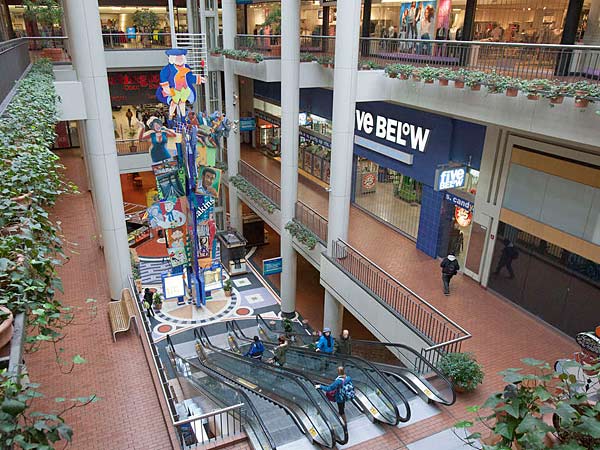Has the Gallery's time finally come - again?
Thirty-seven years after the Center City mall broke new
ground in urban retailing, the Market East shopping center is anything but
cutting-edge. It is tired, mismatched to its surroundings, and a drag on the
wider Center City boom.
Its owner, publicly traded Pennsylvania Real Estate
Investment Trust, has promised to reverse that. Just how and when, however, has
been a bit hazy.
Now, there is increasing evidence that a critical mass is
building and that perhaps, as promised by PREIT chief executive officer Joseph
Coradino, a transformative project is near.
In April, PREIT purchased 901 Market St., now occupied by
Kmart, for $60 million.
"I think that is a pretty good indication they are
serious about this," said Alan Greenberger, deputy mayor for commerce.
"You don't spend $60 million to do nothing."
Then, late last month, Kmart announced it would be closing
in April, opening that Gallery space for reuse months sooner than expected.
Now, PREIT has control of three blocks east of City Hall and
the opportunity to correct some of the well-intentioned mistakes made three
decades ago, when it was believed that a suburban-style indoor mall would give
East Market Street a much-needed boost.
Instead, the enclosed, bunker-like facility proved
unattractive to upscale city shoppers, leaving it increasingly a magnet for
low-end retailers. Though the Gallery's concourse area is vibrant today, its
upper floors are underperforming, with many vacancies and little foot traffic.
PREIT officials did not respond to requests for interviews
for this article, but there is plenty on the public record to offer a peek into
their thinking.
One thing that has been much discussed is opening the mall
more to the streets surrounding it.
"They have had plans for almost four years to basically
create an active street front on Market Street," said Paul Levy, executive
director of the Center City District, "to break down the solid walls and
have lots of doors and windows and restaurants and cafés opening to the
street."
Such a reimagining would dramatically enliven what is now a
rather prosaic stretch of Market Street.
It also would require a lease change, since at the moment
PREIT does not control the exterior walls of the Gallery, which originally was
a $101 million publicly financed project and is still in the public domain.
Greenberger said a new lease has been prepared to give PREIT that control once
the company is ready to move ahead on renovations.
Those renovations will be costly, putting more pressure on
tenant rents. Which argues for more successful tenants.
For some time, PREIT has made it clear that it is seeking
upscale retailers to anchor its reenvisioned mall - or certainly retailers that
could do more to exploit the strengths of the location, now numerous thanks to
the expanded Convention Center, the Market East transit station, and the
growing downtown residential population.
At the moment, there is little about the Gallery to appeal
to any of the above.
"It is not oriented to the current visitors, let alone
the dramatic growth in residential downtown," Levy said. "No one
thinks to go to Market East to shop."
PREIT has signaled two possible directions. One would be to
find a high-end anchor or two, such as Bloomingdales, to provide a draw for
more moneyed consumers.
In June, Coradino told an audience of retailers that
"another possible alternative is what we call 'Fast Fashion and Food,' if
you will, and that is to redevelop it more consistent with some of the more
trendy suburban mall tenants - like the Forever 21, the H&M, the Uniqlo, as
well as restaurants and other food choices."
Robert F. McCadden, PREIT's chief financial officer, told
analysts in April that the direction ultimately would be decided by the
retailers.
"For instance, if we were to secure a high-fashion
luxury department store as an anchor, that would end up having it be one kind
of a project," McCadden said. "Conversely, if we were to secure more
of a discount or popular-price department store, or some kind of a
nontraditional retail anchor, large food market, etc., they would really define
the project differently."
How it plays out is dependent on the complicated dance that
mall owners perform with potential tenants, who typically want to know who
their neighbors will be before committing.
"There are no pioneers in retail," is how Levy
described it. "No retailer will go into a new location in hopes a market follows."
Rather, national brands need to be convinced they will have
the company of other market-creating sellers. All of which means PREIT must
sell itself to multiple retailers simultaneously, with the promise to each that
the others will come along if it does.
It is that process that has seemed to be the biggest drag on
the project.
City Councilman Mark Squilla, whose First District includes
the neighborhood around the Gallery, said his discussions with PREIT have
convinced him that a resolution was near.
"All the pieces are there," Squilla said.
"People are looking to move to the area. All of this is coming together at
a good time."
Which is exciting, said Linda Shein, managing director of
the Jay H. Baker Retailing Center at the University of Pennsylvania's Wharton
School.
"It has been a long time coming, but it has the
potential to be a new centerpiece for Philadelphia," Shein said. "It
is an extraordinary opportunity just waiting to happen."
Source: Philly.com

No comments:
Post a Comment